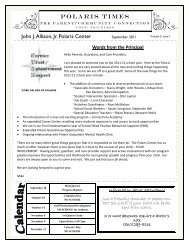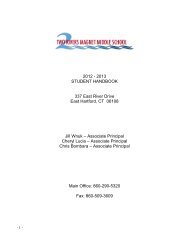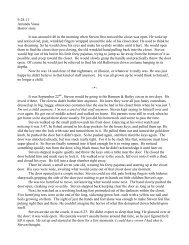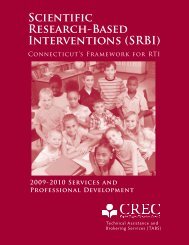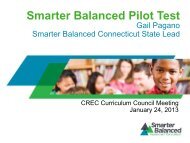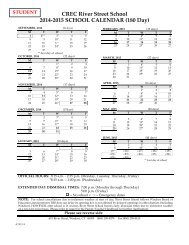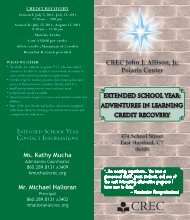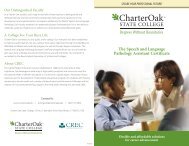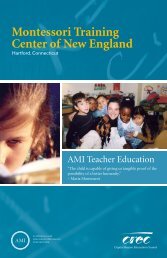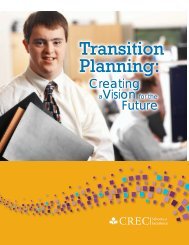Reading and Role Playing: Fiction, Folktales, and Fairy Tale
Reading and Role Playing: Fiction, Folktales, and Fairy Tale
Reading and Role Playing: Fiction, Folktales, and Fairy Tale
Create successful ePaper yourself
Turn your PDF publications into a flip-book with our unique Google optimized e-Paper software.
<strong>Reading</strong> Curricular Calendar, Second Grade, 2012-20133viewpoints, brings out two distinct meanings. As you plan your instruction for this unit, then,you will want to consider what you have taught in prior units, <strong>and</strong> how you can build on thatwork in ways that deepen <strong>and</strong> extend children’s reading skills <strong>and</strong> comprehension.AssessmentThis is an important time to assess your readers, who are quickly nearing the completion ofsecond grade. Readers who were assessed in March may well be ready to move up to the nextlevel. And in general, you’ll want to do what you can to help move kids up the levels of textdifficulty—to be sure that all your students are making a year’s growth. Kids who entered atlevel J should be at level L, approaching M. Kids who entered above grade level, around levelM, will now be at level O, approaching P. Any students who entered below grade level, aroundlevel F or G, should also have made great gains in the year. Many of those readers should be atlevel K, working toward L. Some of them will be ready to move up to another level of textdifficulty. The good news is that your students will be reading fiction books this whole month—so now is a good time to think about making those books more challenging for those who areready. If some readers have not progressed as you’d expected over the course of the year, now isan essential time to intervene. Do these readers need to spend an hour after school, in thebuilding, reading? Do they need to double the amount of reading they are doing at home?Now is also a good time to push your students toward deeper reading comprehension. Certainly,you’ll want to be sure that children are at or nearing benchmark level for Grade Two on theLiterature <strong>Reading</strong> Continuum. They should be able to infer character traits <strong>and</strong> feelings, as wellas the central problem in a story. Moreover, they should carry their inference work across entiretexts, thinking about how the circumstances <strong>and</strong> characters’ feelings change across a story, <strong>and</strong>how these shifts, taken together, create a story not just of happenings, but of meaning. That is,you’ll want your students to underst<strong>and</strong> that stories are imbued with significance, which a readeraims always to uncover. Many second graders, when asked what a story is really about, will tendto retell the entire story rather than inferring a larger meaning. That is, they will rely on thefoundational skill of recall (DOK Level 1). At this stage, readers should be able to process thestory a bit (DOK Level 2), perhaps comparing one character’s response to anther’s. Somestudents may relay a generalized topic—“Friendship”—or a brief summary of the book—movingto the country—rather than naming a theme or specific lesson. As you nudge these children tosay more, help them underst<strong>and</strong> that readers talk in sentences not single words to describe what abook is really about, <strong>and</strong> that they dig deeply, thinking beyond the literal actions of characters totalk about them.As you assess for comprehension, be on the lookout for signs of yet more sophisticated work thatWebb describes as strategic thinking (Level 3). For second graders, this means reading <strong>and</strong>responding to books purposefully, drawing independently from a repertoire of strategies as theyread, supporting their thinking with evidence in the text, <strong>and</strong> the ability to consider differentpossibilities when attempting to underst<strong>and</strong> various characters’ responses <strong>and</strong> motivations.Beyond this, you’ll want to assess for Level 4 work, which Webb describes as extended thinking.That is, can your students apply what they are learning in this one unit of study to other contexts?Can they draw connections, make meanings, think more universally than just across the texts thatthey read in this classroom, this unit? <strong>Fairy</strong> tales <strong>and</strong> folktales are laden with meaning. The oftenheavy h<strong>and</strong>ed messages of these antiquated tales are an opportunity for deeper thinking becauseUnit Six – <strong>Reading</strong> <strong>and</strong> <strong>Role</strong> <strong>Playing</strong>: <strong>Fiction</strong>, <strong>Folktales</strong>, <strong>and</strong> <strong>Fairy</strong> <strong>Tale</strong>s<strong>Reading</strong> <strong>and</strong> Writing Project, 2012 ©DRAFT



